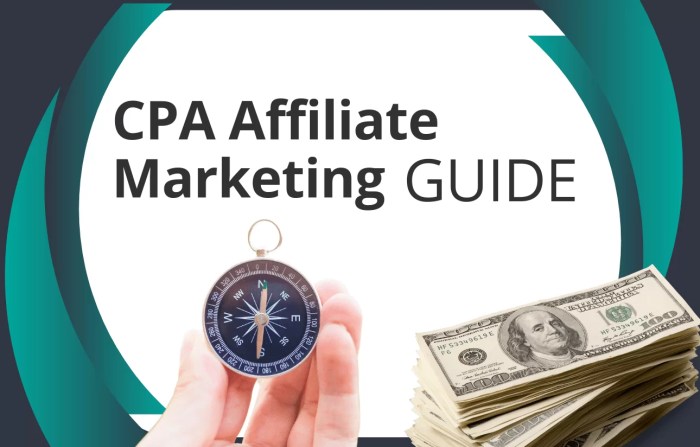Diving into the world of Affiliate Marketing Guide, get ready to unlock the secrets of generating passive income like a boss. From defining the basics to mastering the strategies, this guide has got you covered.
Whether you’re a newbie or a seasoned marketer, this comprehensive guide will take your affiliate game to the next level.
Introduction to Affiliate Marketing

Affiliate marketing is a way for companies to promote their products or services through partnerships with individuals or other companies (affiliates) who receive a commission for driving traffic or sales to the company’s website. It’s a win-win situation where affiliates earn money for promoting products they believe in, while companies increase their sales without having to spend on traditional advertising.
How Affiliate Marketing Works
Affiliate marketing works by the company providing affiliates with unique tracking links that they can use to promote products or services. When a customer clicks on the affiliate’s link and makes a purchase, the affiliate earns a commission. This commission can be a percentage of the sale or a flat fee, depending on the agreement between the company and the affiliate.
Examples of Successful Affiliate Marketing Programs
- Amazon Associates: One of the largest and most popular affiliate marketing programs, where affiliates can earn commissions by promoting Amazon products on their websites or social media platforms.
- Shopify Affiliate Program: Affiliates can earn up to $2,000 for each customer referred to Shopify who signs up for a paid plan, making it a lucrative option for those in the e-commerce space.
- Bluehost Affiliate Program: Bluehost offers affiliates up to $65 for each customer referred who signs up for their web hosting services, making it a great choice for bloggers and website owners.
Getting Started with Affiliate Marketing
To kickstart your journey in affiliate marketing, you need to understand the key players involved, the process of becoming an affiliate marketer, and the popular platforms to join.
Key Players in Affiliate Marketing
- Merchants: These are the businesses or individuals who have products or services to sell. They partner with affiliates to promote their offerings in exchange for a commission.
- Affiliates: Affiliates are individuals or companies who promote the products or services of merchants through various marketing channels. They earn a commission for driving sales or leads to the merchants.
- Customers: Customers are the end-users who purchase the products or services through the affiliate links provided by affiliates. They play a crucial role in the affiliate marketing ecosystem.
Becoming an Affiliate Marketer
- Choose a niche: Select a niche that aligns with your interests, expertise, and target audience.
- Research affiliate programs: Explore different affiliate programs offered by merchants in your chosen niche.
- Join affiliate programs: Sign up for affiliate programs and get your unique affiliate links to start promoting products or services.
- Create valuable content: Develop engaging content to attract your audience and drive traffic to the merchant’s site through your affiliate links.
- Track and optimize: Monitor your performance, track conversions, and optimize your strategies to maximize your earnings as an affiliate marketer.
Popular Affiliate Marketing Platforms to Join
- Amazon Associates: Amazon’s affiliate program allows you to promote a wide range of products and earn commissions on qualifying purchases.
- ClickBank: ClickBank is a popular affiliate marketplace with a variety of digital products across different niches for affiliates to promote.
- ShareASale: ShareASale is an affiliate network that connects affiliates with merchants in various industries, offering a wide range of products and services to promote.
Choosing Profitable Affiliate Products: Affiliate Marketing Guide
When it comes to affiliate marketing, selecting the right products to promote can make a huge difference in your success. Researching and choosing profitable affiliate products requires careful consideration and strategic planning. Let’s dive into how you can make the best choices for your affiliate marketing endeavors.
Research and Selecting Profitable Products
When researching potential affiliate products, it’s essential to look for items that are in demand and have a track record of generating sales. Analyze the market trends, customer reviews, and competition to determine the profitability of each product. Additionally, consider the reputation of the merchant and the quality of the product to ensure you are promoting something valuable to your audience.
Importance of Choosing Products Related to Your Niche
Choosing products that are relevant to your niche is crucial for maximizing your affiliate marketing efforts. By selecting products that align with the interests and needs of your target audience, you increase the chances of driving conversions and earning commissions. This strategy also helps establish your credibility as an authority in your niche, fostering trust with your audience.
Comparison of Commission Structures, Affiliate Marketing Guide
Different affiliate programs offer varying commission structures, such as pay-per-sale, pay-per-click, or pay-per-lead. It’s essential to compare these structures and choose the one that aligns with your goals and preferences. Consider factors like commission rates, cookie duration, and payment frequency when evaluating affiliate programs to ensure you are maximizing your earning potential.
Creating Quality Content for Affiliate Marketing
Creating quality content is essential for successful affiliate marketing campaigns. Engaging your audience and providing valuable information can lead to higher conversions and more commission. Transparency and authenticity play a crucial role in building trust with your audience, ultimately driving more sales. Here are some tips and strategies for creating quality content for affiliate marketing:
1. Know Your Audience
Understanding your target audience is key to creating content that resonates with them. Research their interests, preferences, and pain points to tailor your content accordingly.
2. Provide Value
Offer valuable insights, tips, and information that your audience can benefit from. Focus on solving their problems or fulfilling their needs to establish yourself as a trusted source of information.
3. Be Authentic
Authenticity is crucial in affiliate marketing. Be honest about your partnerships with brands and products. Disclose your affiliate relationships to maintain transparency with your audience.
4. Integrate Affiliate Links Naturally
Avoid spammy or forced placements of affiliate links in your content. Instead, seamlessly integrate them into your recommendations or product reviews. Consider using call-to-action buttons or banners for a more subtle approach.
5. Create Engaging Content
Utilize various formats such as blog posts, videos, podcasts, or social media posts to keep your content fresh and engaging. Experiment with different content types to see what resonates best with your audience.
6. Monitor Performance
Track the performance of your affiliate links and content to understand what works best for your audience. Analyze metrics such as click-through rates, conversion rates, and revenue generated to optimize your strategies.
By following these tips and strategies, you can create quality content that not only engages your audience but also drives conversions for your affiliate marketing efforts.
Promoting Affiliate Products

When it comes to promoting affiliate products, there are several channels that affiliate marketers can utilize to reach their target audience. These channels include websites, social media platforms, and email marketing campaigns. Each channel has its own unique advantages and can be effective in driving traffic and sales for affiliate products.
Using Websites to Promote Affiliate Products
One of the most common ways to promote affiliate products is through a dedicated website or blog. By creating high-quality content related to the affiliate products, marketers can attract organic traffic from search engines and engage with their audience effectively.
- Write product reviews and recommendations to provide valuable information to your audience.
- Include affiliate links strategically within your content to drive clicks and conversions.
- Optimize your website for to improve visibility and ranking on search engines.
Leveraging Social Media for Affiliate Marketing
Social media platforms offer a great opportunity to promote affiliate products to a large audience. By sharing engaging content, images, and videos, marketers can capture the attention of their followers and drive traffic to their affiliate links.
- Create dedicated posts promoting affiliate products with compelling visuals and captions.
- Engage with your audience through comments, messages, and live sessions to build trust and credibility.
- Utilize paid advertising on social media to reach a wider audience and increase conversions.
Email Marketing Campaigns for Affiliate Products
Email marketing remains a powerful tool for promoting affiliate products and driving conversions. By building an email list of subscribers interested in your niche, you can send targeted campaigns that promote affiliate products effectively.
- Segment your email list based on interests and preferences to send relevant affiliate offers.
- Create engaging email content with clear call-to-action buttons directing subscribers to affiliate product pages.
- Track email open rates, click-through rates, and conversions to optimize your email marketing strategy for better results.
Remember to disclose your affiliate relationships transparently to your audience to maintain trust and comply with regulations.
Monetizing Affiliate Marketing Efforts
In order to maximize your affiliate marketing efforts and increase revenue, it’s important to focus on scaling your strategies, building a loyal audience, and diversifying your affiliate partnerships.
Scaling Affiliate Marketing Efforts
- Explore new platforms and channels to reach a wider audience.
- Optimize your content and strategies to improve visibility and attract more traffic.
- Test different affiliate products and campaigns to identify what works best for your audience.
Building a Loyal Audience
- Create valuable and engaging content that resonates with your target audience.
- Interact with your audience through social media, email marketing, and other channels to build trust and loyalty.
- Offer exclusive deals, discounts, or content to reward loyal followers and encourage repeat business.
Diversifying Affiliate Partnerships
- Partner with a variety of merchants and affiliate programs to reduce dependency on any single source of income.
- Explore partnerships with different types of products or services to cater to a broader audience.
- Regularly review and update your partnerships to ensure they align with your audience’s interests and preferences.